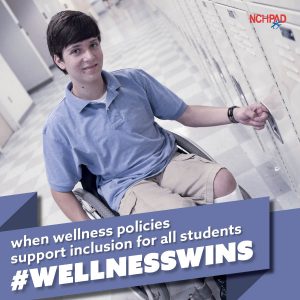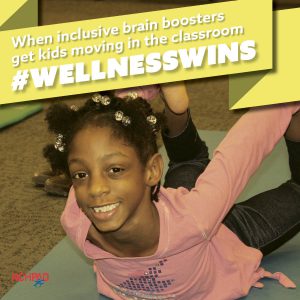By NCHPAD
All children – from all disability, racial, ethnic, and socioeconomic groups, through all grades, and in urban and rural settings – benefit from regular physical activity and good nutrition. Local school wellness policies help set children up for a healthy future by cultivating healthy eating and physical activity habits and that’s why NCHPAD is happy to be a supporter of The Alliance for a Healthier Generation‘s #WellnessWins campaign.
National efforts to reverse the trends of youth physical  inactivity and childhood obesity focus on increasing physical activity and other health promotion efforts during the school day and updating school wellness policies. Children and youth with disabilities are often not fully included in these efforts, yet often experience even greater rates of physical inactivity and obesity. The obesity rate for children with a disability is 38 percent higher than children without a disability. Focusing on health promotion and increasing physical activity during childhood can encourage lifelong habits that can decrease the risk of chronic disease in adulthood.
inactivity and childhood obesity focus on increasing physical activity and other health promotion efforts during the school day and updating school wellness policies. Children and youth with disabilities are often not fully included in these efforts, yet often experience even greater rates of physical inactivity and obesity. The obesity rate for children with a disability is 38 percent higher than children without a disability. Focusing on health promotion and increasing physical activity during childhood can encourage lifelong habits that can decrease the risk of chronic disease in adulthood.
Let’s Talk Inclusion
Inclusion assumes that all children, regardless of ability or disability, have the right to:
- Be respected and appreciated as valuable members of the school community
- Fully participate in all school activities
- Interact with peers of all ability levels with opportunities to develop friendships and learn and respect differences
In many cases, increasing wellness opportunities for children and youth with disabilities is easier said than done. It is important to acknowledge that barriers related to health promotion programming for children and youth with disabilities exist. These barriers include:
- Lack of community accessibility and accessibility of existing facilities and programs
- Lack of knowledge of existing programs
- Transportation
- Lack of knowledge of the importance and health benefits of physical activity
- Inadequate family support
Full inclusion begins with the recognition that children and youth with disabilities are integral members of the school community and must be more than just acknowledged as an afterthought.
How can wellness policies support inclusion?
The Guidelines for Disability Inclusion in Physical Activity, Nutrition, and Obesity Program Initiatives assist in updating community health programs and policies to be inclusive of the needs of people with disabilities. Schools, as part of the community, can use these same guidelines to promote inclusion within the school setting for children and youth with disabilities. The Guidelines can be viewed and utilized as part of a commitment to inclusion. You can learn more at http://committoinclusion.org/9-guidelines-for-disability-inclusion/.
In closing, there are six key concepts to keep in mind in the development, implementation and evaluation of school wellness policies.
- Involve people with disabilities or representatives on committees
- Educate committee members about inclusion, accessibility, and health disparities of people with disabilities
- Keep people with disabilities or those that represent the interests of people with disabilities involved in all aspects of the wellness policy from development through evaluation
- Assess inclusion of students with disabilities and other issues specific to physical activity, wellness, and students with disabilities
- Provide specific wording throughout that includes children and youth with disabilities
- Be creative- fully including children and youth with disabilities might require thinking outside of the box
For more information on inclusion in school wellness policies, refer to the Discover Inclusive School Wellness guide and the Educators page at www.nchpad.org/Educators.
Check out the Alliance for a Healthier Generation’s #WellnessWins campaign page for all you need to know about school wellness policies.
Spread the word! Share this post with your network using one of these sample tweet:
- When wellness policies support inclusion for all students, #WellnessWins! Read how on the BAYW blog http://bit.ly/2qw9zfz
- .@NCHPAD shares ways you can #CommitToInclusion in school wellness. Learn about #WellnessWins on the BAYW blog. http://bit.ly/2qw9zfz